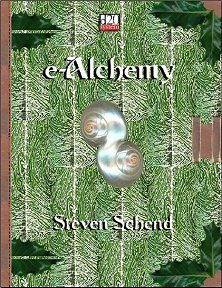
This short work served as a preview of the full Alchemy and Herbalists book, and as such skims through many of the ideas about alchemy and herbalism that are gone into more fully therein. It starts off by defining alchemy not as merely a bunch of people trying to turn lead into gold, but as a quest for perfection - of self and of knowledge. Or you can see it as the mediaeval equivalent of doing chemical research.
There's a detour into the D20 ruleset, with the Player's Handbook definition, reducing alchemy to the making of poisons and potions and a few items, as covered in the core rules. However as a calling it is far, far more than that. It can be a whole new philosophy, rather than another skill to add to a skill list and use when the occasion arises. You might think that such a character would be rather dull to play... but consider this, a player-character cleric doesn't spend all his time in game praying and studying holy texts - so why should a character who has devoted himself to alchemy as his vocation not be able to participate fully in adventuring activities too? The study and lab work can be viewed as 'background' just as a cleric's devotions are. Alchemy can be self-taught, learned from a master by taking an apprenticeship, or studied at a college of alchemy. The full book includes a detailed school (and one for herbalists as well) for those characters that choose that path. There's also the Red Alchemist, a new class that demonstrates a particular philosophy, just one of the approaches that alchemists can take to their work.
Chapter 3 looks at herbalism in a similar manner. Looking at the D20 ruleset, with characters who take it as a Knowledge skill being more akin to a field botanist, able to find and identify plants and with some idea of what they can be used for; while one with Profession: Herbalism will be well-versed in how to make herbal remedies and treat patients... or kill victims. The Apothecary limits themself to the curative properties of plants, the Herbalist knows how to use them for good or for ill. There's a bit about finding plants here too.
Moving on, there are thumbnail sketches of some notable personalities. You might want to use them as NPCs, or maybe there are just people the well-educated alchemist or herbalist would know about. Every profession has such well-known practitioners, after all. There's a brief sample of the kinds of items that can be prepared, and the full index to the complete book. By now you should have a good idea of what it contains, its style and philosophy, and be able to make an informed decision whether or not you'd like to add it to your library.
Return to E-Alchemy page.
Reviewed: 19 August 2019

